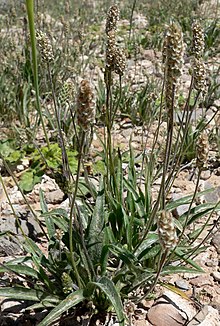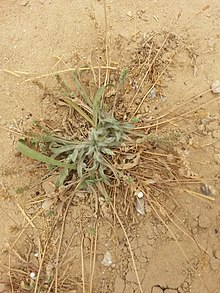Plantago ovata, known by many common names including blond plantain,[1] desert Indianwheat,[2] blond psyllium,[3] and ispaghol,[3] is native to the Mediterranean region and naturalized in central, eastern, and south Asia and North America.[4]
| Plantago ovata | |
|---|---|

| |
| Scientific classification | |
| Kingdom: | Plantae |
| Clade: | Tracheophytes |
| Clade: | Angiosperms |
| Clade: | Eudicots |
| Clade: | Asterids |
| Order: | Lamiales |
| Family: | Plantaginaceae |
| Genus: | Plantago |
| Species: | P. ovata
|
| Binomial name | |
| Plantago ovata | |
| Synonyms | |
| |

It is a common source of psyllium, a type of dietary fiber.[5] Psyllium seed husks are indigestible and are a source of soluble fiber which may be fermented into butyric acid – a short-chain fatty acid – by butyrate-producing bacteria.[6] Plantago ovata is the most popular source for commercial products containing psyllium.[7]
References
edit- ^ BSBI List 2007 (xls). Botanical Society of Britain and Ireland. Archived from the original (xls) on 2015-06-26. Retrieved 2014-10-17.
- ^ USDA PLANTS, retrieved 10 June 2016
- ^ a b USDA GRIN Taxonomy, retrieved 10 June 2016
- ^ "Plantago ovata in Flora of China @ efloras.org". www.efloras.org. Retrieved 2020-12-07.
- ^ Medlineplus. Blond psyllium (Plantago ovata)
- ^ Jovanovski, Elena; Yashpal, Shahen; Komishon, Allison; et al. (15 September 2018). "Effect of psyllium (Plantago ovata) fiber on LDL cholesterol and alternative lipid targets, non-HDL cholesterol and apolipoprotein B: a systematic review and meta-analysis of randomized controlled trials". The American Journal of Clinical Nutrition. 108 (5): 922–932. doi:10.1093/ajcn/nqy115. ISSN 0002-9165. PMID 30239559.
- ^ Melton, Laurence, ed. (2019). Encyclopedia of Food Chemistry. Netherlands: Elsevier. p. 62. ISBN 978-0-12-814045-1.
External links
editWikimedia Commons has media related to Plantago ovata.